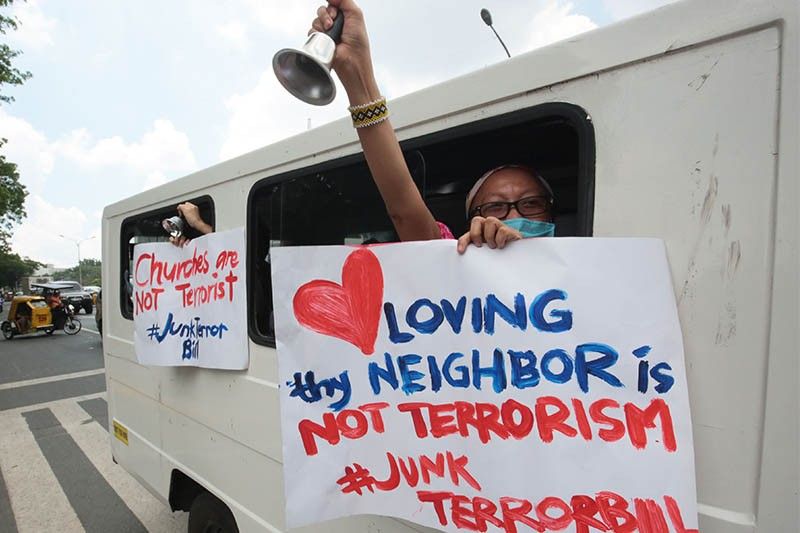Rights group slams 'rubber stamp' House for swift passage of Anti-Terror Bill

MANILA, Philippines — Rights group Karapatan on Wednesday slammed the passage of the Anti-Terror Bill, which its Secretary General Cristina Palabay, said is a "blatant travesty of democratic checks and balances."
On the same day, and in days prior, hundreds of organizations and people — including celebrities — had voiced opposition to the bill, which critics say the government could use to penalize and silence dissent and criticism of the government.
President Rodrigo Duterte certified the bill as urgent on Monday the House approved it on second reading by Tuesday evening— this while some economic stimulus bills in the country’s fight against the COVID-19 pandemic remain pending.
“With Duterte controlling all branches of government, a rubber stamp Congress with not a single ounce of legislative independence is already a clear and glaring sign of dictatorship,” Palabay added.
She said that the bill had removed “human rights safeguards and penalties for abuses.”
In a statement on Wednesday, the Department of the Interior and Local Government said that only terrorists should fear passage of the bill, adding that the government welcomes criticism as part of democracy
READ: Anti-Terror Bill will not be used to silence dissent, DILG says
The DILG, in April, said it would file criminal complaints against activists who had volunteered for a relief mission in Norzagaray, Bulacan, saying they had attempted to hold a mass gathering and hand out propaganda critical of the government.
The department's spokesman also said that same month that a spontaneous protest by residents of Sitio San Roque who were asking for food and aid was part of "a political agenda to agitate and mobilize the people."
The very same DILG, in August 2019, had proposed reviving the Anti-Subversion Law, a repealed law that made being a communist a crime.
"When activists are being red-tagged and vilified as ‘communist terrorists’ and when anyone who expresses dissenting opinions on government measures are arrested and jailed, we have every reason to believe that the bill will not only be prone to abuse, the fascist regime will wield it as a legal weapon against dissent," Palabay said Wednesday.
Government officials have accused Karapatan as well as other activist organizations of being fronts for communist rebels, allegations that they as well as the Commission on Human Rights have warned puts activists and human rights workers in danger.
READ: How activists respond to being tagged as rebels
Even without the imposition of the bill, authorities have started arresting social media users and accusing them of violations of the Revised Penal Code such as the “unlawful use of means of publication and unlawful utterances.”
Arrests have also be carried for social media users who post improbable threats against the president, commentary on the usage of public funds and even satirical posts.
Sereno: Congress must ask important questions before passing bill
Former Chief Justice Maria Lourdes Sereno on Wednesday warned lawmakers that they must first answer questions on the people’s freedoms under the controversial Anti-Terrorism Bill, but her warning came too late.
"Our people need to hear our lawmakers ask the most important questions about our survival as a nation and the future of our freedoms under the proposed Anti-Terrorism Act of 2020," Sereno said in a statement.
Sereno stressed that the human spirit is the key principle in the country's constitutional rights, and this allows the government to exist, to “enable the people build a ‘just and humane society.’”
RELATED: Don't sacrifice rights in fight vs terrorism, government told
“That is why the Congress must, in this perilous hour when national existential questions are uppermost in the minds of the people, make the effort to ask those questions and not stop, until the present bill satisfies the standards of justice and human compassion,” the ousted chief justice added.
The House of Representatives on Wednesday approved on third and final reading the “Anti-Terrorism Act of 2020” despite widespread criticism and mounting calls for rejection.
The bill contains provisions for expanded surveillance of private communications and unclear definitions of acts that may be construed as “terrorism” and “inciting to terrorism.”
“Suspected” terrorists may also be detained up to 24 days, and if, in the end, they were falsely accused, they will not be compensated. The proposed bill deleted a provision of the Human Security Act that held that acquittal or dismissal of charges against an accused entitles them to P500,000 a day for the period when their assets were seized.
Petitions against the Human Security Act
Sereno, removed as chief justice by her colleagues in 2018, also recalled she had listened to the defense and military’s “difficulties” in implementing the Republic Act 9372 or the Human Security Act of 2007.
“I had expressed the judiciary’s intention to ensure that operationally, courts were not going to stand in the way of the successful implementation of the nation’s anti-terrorism programs,” she said.
Critics call the Anti-Terror Bill “much worse” than the Human Security Act of 2007, which the International Commission of Jurists said in 2015 is inconsistent with international human rights laws and standards.
RELATED: Proposed Human Security Act amendments raise rights concerns
“It was then my view, that those problems could be resolved if agency agreements between the Executive Department and the Judiciary could be crafted, that take into account the agencies’ implementation difficulties vis-a-vis the required careful culture of courts whose primary function is to defend human dignity and the rights of every Filipino,” Sereno added.
At least three petitions assailing the constitutionality of the HSA had been filed before the SC. Among them was by a group represented by Harry Roque, at the time a human rights lawyer but who is now presidential spokesperson and who says the Human Security Act is too lenient.
The tribunal however junked the plea as it held that the petitioners “failed to demonstrate how they are left to sustain or are in immediate danger to sustain some direct injury.”
The SC also held that the “possibility of abuse...does not avail to take the present petitions out of the realm of the surreal and merely imagined.”
Sereno said the tribunal “never had the chance to pass upon the constitutionality of the substantive portions of the Human Security Act of 2007.”
- Latest
- Trending





























